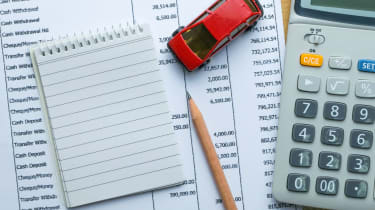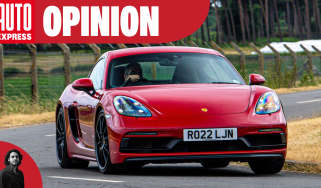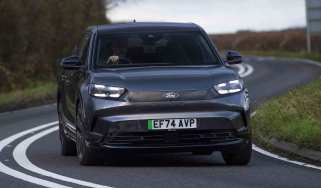Can you lease a used car? Second-hand car leasing deals guide
When we think of leasing, we tend to think of new cars, but leasing a used car is an option worth looking at

You're probably used to the concept of leasing a new car – instead of taking the financial risk of buying the car outright, you essentially rent the car and make smaller payments over an agreed period. But can you lease a second-hand car? The good news is that you can, and it could be an option well worth considering.
You could say leasing a second-hand car gives you the best of both worlds. Your monthly payments are typically smaller than if you leased new due to the used depreciation, but you still get a relatively new model, which could be cheaper to run and will have more up to date technology than if you bought an older car outright.
Used car leasing has been on the up in recent years. Leasing companies have had their fingers burned by older electric cars that have depreciated rapidly as EV technology has advanced. Rather than crystallising their losses by selling these vehicles after the initial new car lease term, the firms have been leasing them out again as used cars. It all means some very attractive deals for customers willing to consider leasing a used car.
You can check out the latest leasing deals on our leasing hub page or scroll down to find out how exactly used car leases work. Discover what the advantages and disadvantages are...
Is leasing a second-hand car better than buying?
In some respects, whether you decide to lease or buy a second-hand car is down to your own personal circumstances. If you can afford to buy a newish car outright it makes sense. There’s no need to worry about monthly payments, and it could be cheaper because you’re not paying any interest.
All fine and dandy if you’re willing to splurge the cash up front, but what if you’re not? And what happens to all that money you’ve paid upfront if the car's value drops like a rock?
That's when leasing a second-hand car could make a lot of sense. You don’t need to generate a pile of money to get your hands on the used car you’ve been ogling in the showroom. It could even mean you can afford that dream car you’d previously dismissed as too expensive.
Even if you can afford to pay for a brand new car upfront, leasing a car means you can save that extra cash and negates any financial risk of depreciation if the car’s value drops unexpectedly before you hand it back at the end of a finance agreement.
How does used car leasing work?

Predictably, used car leasing works in the same way as leasing a new car only the car in question is second-hand.
Instead of paying the full amount upfront, you pay a pre-agreed initial payment, followed by monthly instalments over an agreed period. This typically runs for between 24 and 60 months on a lease deal.
You’ll have a set annual mileage limit – with a by-the-mile penalty charge if you exceed it – and, unlike in a PCP finance agreement, there’s no option to buy the car outright with a final balloon payment. You pay your dues, hand the car back and move on to the next one.
What’s the oldest car you can lease?
No figure’s set in stone, but as a general rule, you’re likely to lease a used car from a franchised dealer – so it’ll probably be no more than three years old.
This is because the lender is looking to protect its investment long term, so most well known leasing companies have a rule of a car being no more than 5 years old at the end of the agreement. This means if you’re looking at a three-year old car to lease, you’re likely only going to be allowed to lease it for two years.
The advantage to picking a used car from a franchised dealership is that the car will have been put through the manufacturer’s approved-used scheme, so it’ll have been subject to a multi-point check and come with a warranty.
Is leasing a second-hand car cheaper than buying a second-hand car?

If you’re looking at a cheaper overall package, it’s unlikely with a used lease. Leasing a car means paying interest that you wouldn’t have to pay if you bought the used car outright with your own cash. Also, you miss out on the savings you can make buying a car privately.
However, there can be exceptions. Say you buy a car that’s six months old and sell it 12 months later, it’s likely that the cost of depreciation will far outweigh any savings you made on interest, unless you’re looking at a very highly desirable car which could actually increase in value.
What are the advantages of leasing a second-hand car?
The main advantage of leasing a second-hand car is that you get it by paying multiple, relatively small monthly payments – rather than having to pay the whole lot upfront.
That could be a sensible thing to do. Instead of getting your hands on a car that could end up being unreliable, likely to break down, as well as being expensive to tax and fuel, you can get a much newer model that’ll be more reliable and cheaper to run, without the worry of unexpected costs. It should also have a warranty and you may be able to factor servicing costs into the monthly payment, too.
But because you’re still buying second-hand, you make a significant saving over getting the same car brand new on a lease – effectively, you’re taking advantage of the heavy depreciation most cars suffer in their early years. You could call it a win-win.
What are the disadvantages of leasing a second-hand car?
One of the main disadvantages of leasing a second-hand car is that you’ll never actually own it, which could be annoying for several reasons.
Say you buy a new car on a PCP finance deal, when you reach the end of the agreement, you’ll get the option to make a final balloon payment and own the car – tempting because you’ll know the car’s been properly looked after. It’s a less nerve-racking experience than buying a car that you don’t know has been cherished.
On the other hand, if you buy an older second-hand car outright, run it for a few years, then decide to change it for something else, you can part exchange it against your replacement, getting a handy wad of cash you’d otherwise miss out on.
Ultimately, buying a second car outright also gives your more flexibility – you can get rid whenever you want, without incurring any extra charges. And you're not tied to an annual mileage limit, which could prove costly if your circumstances change and you’re suddenly doing a lot more driving.
Tell us which new car you’re interested in and get the very best offers from our network of over 5,500 UK dealers to compare. Let’s go…









